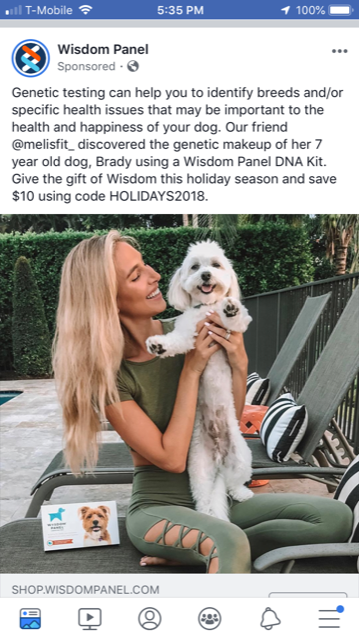Happy Thursday, readers! Many of you know that on top of being a genetics nerd, I am a big animal person. I’m always encouraging pet adoption, and before we adopted Buddy, I’d frequent the Humane Society to socialize with the shelter pets. I adore animals, and if genetic counseling didn’t exist, there’s a good chance I might have ended up a vet! (Which, btw, is another professional program with extremely competitive admissions, it seems some of us have the propensity for fields like that haha.) Since I’m so into both animals and genetics, and I also have an adopted dog of my own, it makes sense that I pretty frequently see ads like this:

One day I’m probably going to write a post about human direct-to-consumer genetic tests, including what I thought about my Ancestry DNA results and all of that. But given what’s been going on with our furry child lately, these doggie DNA tests I see advertised have been on my mind. Are some of his problems genetic, caused by poor breeding? Could a Breed + Health Indications test like Embark or Wisdom Panel point to any answers, and would it matter if they did?

That got me thinking… what happens if a canine genetic test does reveal life-altering information for a pet. There’s no veterinary genetic counselors to interpret the results, or offer support to the family. Pet parents know furry best friends are beloved family members and to learn there’s something wrong with them could be a true crisis. Do vets feel prepared for the growing trend of pet DNA tests, requiring vets to interpret and guide families through DNA results, all while maintaining all of their other duties as a practitioner? Or rather, could DNA testing and pet love continue to boom until we reach a need for veterinary genetic counselors? Let me tell you, I had no idea how vets feel about it because I’m not one! So, I surveyed some vet-minded people (casually on Reddit, so, you know, not perfect science, but preliminary research 😂), and here’s a few things I learned.
*****
Less Research and Interest in Pet DNA Tests Compared to Human DNA Tests
Unlike genetic counselors, who fairly regularly meet patients who have pursued or wish to pursue direct-to-consumer (DTC) testing, vets do not see as much interest from pet parents regarding their furry friend’s DNA. Vet bills already run high, and pet insurance, if the family has it, still doesn’t cover much. Many families are not interested in spending even more on their pet’s health maintenance, so they decline genetic testing offered at the vet, and don’t seek DTC testing.
It seems like deciding not to seek pet DNA testing is a good choice at this time. Many vets believe the science of pet DNA testing isn’t as solid as DTC test companies make it seem, at least not yet. These are for-profit companies who ultimately want to make money, and such they promise to be able to tell a pet’s breed and health risks. In reality, breeds are human-decided, and science hasn’t figured out the complexity of genetic and partially-genetic diseases in pets yet. They can be interesting, but regular vet care goes a lot further in understanding and maintaining a pet’s wellbeing.
Recurrence Risk Isn’t an Issue for Most Pets
A majority of humans have children or are interested in having children at some point. Such, most of us are concerned about any genetic health factors we could pass on to a child. In other words, we are concerned about the recurrence risk of a deleterious mutation. Responsible pet owners who are not breeders, on the other hand, spay and neuter their pets, so they won’t bring any little pets into this world. Thus, for the average pet owner though it’s not relevant to know if their pet is a carrier for a disease or has a potentially disease-causing mutation, that hasn’t penetrated (caused the disease itself). The desexed house pet will not be passing on any deleterious mutations, and regular vet visits will catch most health issues, without a DNA test telling them to look for those issues.
DTC Testing Holds Great Importance in the Breeding Trade
We see in most cases, DTC DNA testing for pets is not necessary or useful. However, one vet who also breeds dogs responded that DTC testing is critical to their breeding process. They can ensure they are maintaining desired breed traits, and prevent potential breeding pets from breeding if they are carrying a genetic disease. This respondent mentioned that a DTC DNA test revealed that one of their sires carried a mutation for a clotting disorder. However, on further interpretation of the mutation, they learned the mutation did not affect dogs of that breed.
In this example, we see that some DTC tests for pets do require further analysis than just looking at the report provided from the lab. Fortunately, this vet still felt prepared to handle the result by researching the mutation more and contacting the lab to understand their analysis better. As research into animal genetics continues to grow their may be more breeders interested in DTC testing, and more complex results to be interpreted.
*****
The interpretation process that vet mentioned sounds pretty similar to the way genetic counselors research rare disease mutations and complex lab results. I was impressed to learn that vets participate in that process on top of everything else they have to do and understand to be a successful clinician. I’m so grateful I got to talk to and learn from them.
So will there be vet genetic counselors in the future? Probably not until a greater number of reputable, vet-endorsed pet DNA tests come into existence. Still, research will continue as it always does, and some day there may be a need for a small number of animal-centric genetic counselors. Likely, they’d be trained in an entirely different master’s program, associated with vet schools or animal science research programs. I could see them working in an industry role at the labs offering testing, to be a point of contact for vets interpreting results. Maybe there will be somebody who starts a business helping breeders find, perform, and interpret the best DNA testing for their breeding process.
The genetics field continues to grow and I can only imagine that new careers in human genetics, as well as animal, plant, and microbial genetics will emerge over time. I’m going to be a genetic counselor (for humans!) Who knows what all the next generation of geneticists will be. I’m excited to see it all unfold over my lifetime.
-Laura Cooper-Hastings
